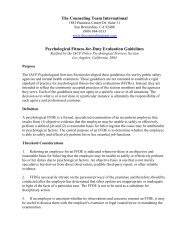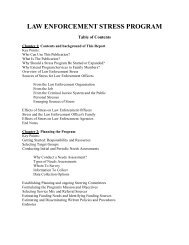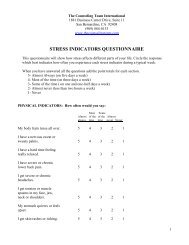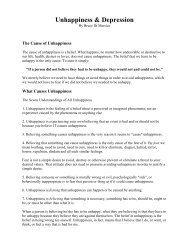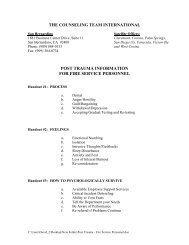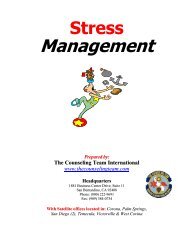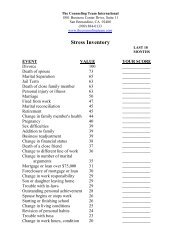Jess Maghan, Ph.D. Associate Professor, Criminal Justice Office of <strong>International</strong> CriminalJustice (MC 141) University of Illinois at Chicago 1033 West Van Buren Street Chicago, IL60607-2919John Maloy Superintendent Training Academy New York State Department of CorrectionalServices 1134 New Scotland Road Albany, NY 12208-1097Michael Marette Director, Corrections United American Federation of State, County, andMunicipal Employees (AFSCME) 1625 L Street, NW Washington, D.C. 20036Prepared for the National Institute of Justice, U.S. Department of Justice, by AbtAssociates Inc., under contract #OJP-94-C-007. Points of view or opinions stated inthis document are those of the author and do not necessarily represent the officialposition or policies of the U.S. Department of Justice.<strong>The</strong> National Institute of Justice is a component of the Office of Justice Programs,which also includes the Bureau of Justice Assistance, the Bureau of Justice Statistics,the Office of Juvenile Justice and Delinquency Prevention, and the Office for Victimsof Crime.ForewordStress among correctional officers is widespread, according to research studies and anecdotalevidence. <strong>The</strong> threat of inmate violence against officers, actual violence committed by inmates,inmate demands and manipulation, and problems with coworkers are conditions that officershave reported in recent years can cause stress.Those factors combined with understaffing, extensive overtime, rotating shift work, low pay,poor public image, and other sources of stress can impair officers' health, cause them to burn outor retire prematurely, and impair their family life. This publication is designed to helpcorrectional administrators develop an effective program to prevent and treat officer stress.Seven case studies illustrate diverse options for structuring a stress program. <strong>The</strong> following areamong the seven programs' distinguishing features that administrators can consider adopting:Run the program in-house or contract with external agencies.Offer professional counseling, peer support, or both.Address chronic stress, stress following a critical incident, or both.Conduct academy or inservice training.Serve family members.In addition to those operational aspects, the report discusses options for staffing a stress program;explores methods of gaining officers' trust in the program; lists sources of help to implement orimprove a stress program; and covers monitoring, evaluation, and funding issues.
<strong>The</strong> various program options presented in this report constitute, in effect, a "menu" from whichcorrectional administrators can select program features and tailor them to a particular set ofneeds and resources. <strong>The</strong> potential payoff attributed to stress programs--uch as reduced stressrelatedovertime costs, improved officer performance, and increased institutional safety--morethan justifies careful consideration of this report's observations and conclusions.Julie E. Samuels Acting Director National Institute of JusticeAcknowledgmentsI wish to thank the many individuals who patiently answered my questions and sent me materialsabout their stress programs, in particular, the following program directors and coordinators:Bruce W. Baker, Lawrence H. Bergmann, Nancy K. Bohl, John J. Carr, James Hollencamp,Elaine Smith, and Edward J. Stelle.Several other program staff members, correctional officers, and other employees were especiallyhelpful in providing information for this report, including David Bielby, Cathy Carlson, AceyEdgemon, Edward Ferguson, Richard Gould, Robert S. Hamel, Barry S. Levin, MichaelMcGarthy, Mark Messier, <strong>The</strong>odore Nevills, A.T. Wall, and Robert White. Special mentionshould be made of Daniel James Nagle, a corrections officer in Beeville, Texas, who was killedby an inmate several months after being interviewed for this report.Roger J. Johnson provided information about his training activities for corrections personnelacross the country; Richard Gist shared his insights into critical incident debriefings.<strong>The</strong> following advisory panel members provided helpful guidance to the project during a 1-daymeeting in Washington, D.C., and through comments on the draft report: Nancy K. Bohl, Gary F.Cornelius, Jess Maghan, John Maloy, and Michael Marette. Among other criteria, panelmembers were selected for their diverse experiences and views regarding stress programming forcorrectional officers. As a result, readers should not infer that the panel members necessarilysupport all the programming recommendations offered in this publication.Vincent Talucci, program monitor for the project at the National Institute of Justice, gaveconstant support and guidance to the project. <strong>The</strong>odore Hammett, vice president at AbtAssociates Inc., offered a number of valuable suggestions for improving the report. Mary-EllenPerry and Joan Gilbert carefully produced the numerous report drafts.Peter FinnAssociateAbt Associates Inc
- Page 1: ISSUES AND PRACTICESAuthor: Peter F
- Page 5 and 6: Program overviewCollaboration with
- Page 7 and 8: An unproven interventionPotential b
- Page 9 and 10: Executive SummaryAddressing Correct
- Page 11 and 12: One officer said, "The public hasn'
- Page 13 and 14: Correctional officer union official
- Page 15 and 16: Doing the job carefully in records
- Page 17 and 18: 2. "Commissioner Locks Down Prison
- Page 19 and 20: Chapter 2The Extent and Sources of
- Page 21 and 22: In many prisons and jails, there ar
- Page 23 and 24: promising not to create trouble or
- Page 25 and 26: 6. Martinez, A.R., "Corrections Off
- Page 27 and 28: How to Cope with Job Burnout, New Y
- Page 29 and 30: e. Kamerman, J., "Corrections Offic
- Page 31 and 32: Family Service Society serves only
- Page 33 and 34: Society also provides inservice tra
- Page 35 and 36: Family Service Society refers emplo
- Page 37 and 38: Staff more likely to be viewed by o
- Page 39 and 40: Unit team responsibilitiesTypically
- Page 41 and 42: officers were involved. We took tur
- Page 43 and 44: In 1998, the New York State Departm
- Page 45 and 46: An officer and a lieutenant, both o
- Page 47 and 48: Bruce W. BakerAssistant Commissione
- Page 49 and 50: Technical assistance and training t
- Page 51 and 52: Chapter 4Program Staffing, Training
- Page 53 and 54:
Most new clinicians fill in their g
- Page 55 and 56:
wanted the best. In addition, the p
- Page 57 and 58:
Each New York State Department of C
- Page 59 and 60:
DOCs and sheriff's departments can
- Page 61 and 62:
Counseling Team] that it's OK to sa
- Page 63 and 64:
Outreach to line officers is essent
- Page 65 and 66:
The program permits team members to
- Page 67 and 68:
Exhibit 5-1 Union MemorandumAccordi
- Page 69 and 70:
The Counseling Team and Rhode Islan
- Page 71 and 72:
grant ended in December 1998, Sheri
- Page 73 and 74:
Snacks, lunch, and child care were
- Page 75 and 76:
As with wardens, seeing is believin
- Page 77 and 78:
1. For further information about th
- Page 79 and 80:
department. However, the rules of c
- Page 81 and 82:
John Near, the South Carolina DOC's
- Page 83 and 84:
While there is no evidence that deb
- Page 85 and 86:
Organizational changes departments
- Page 87 and 88:
* Appelbaum, P.S., and T.G. Gutheil
- Page 89 and 90:
Telephone hotline, providing 24-hou
- Page 91 and 92:
Chapter 7Evaluation, Funding, and T
- Page 93 and 94:
the regional teams and facility adm
- Page 95 and 96:
A psychologist hired under the gran
- Page 97 and 98:
Assuming four of the five unit memb
- Page 99 and 100:
consultation.
- Page 101 and 102:
the survey that will follow." The r




